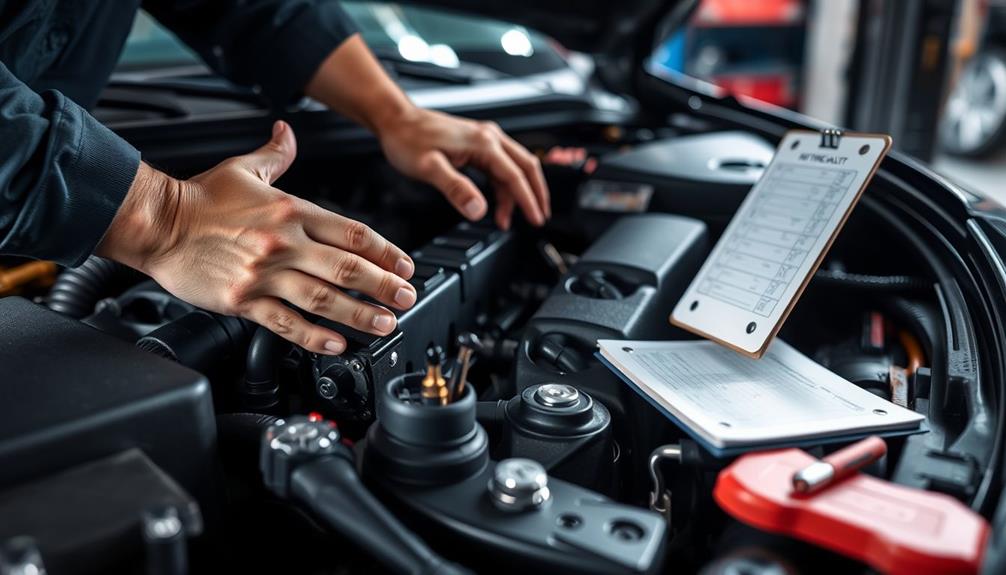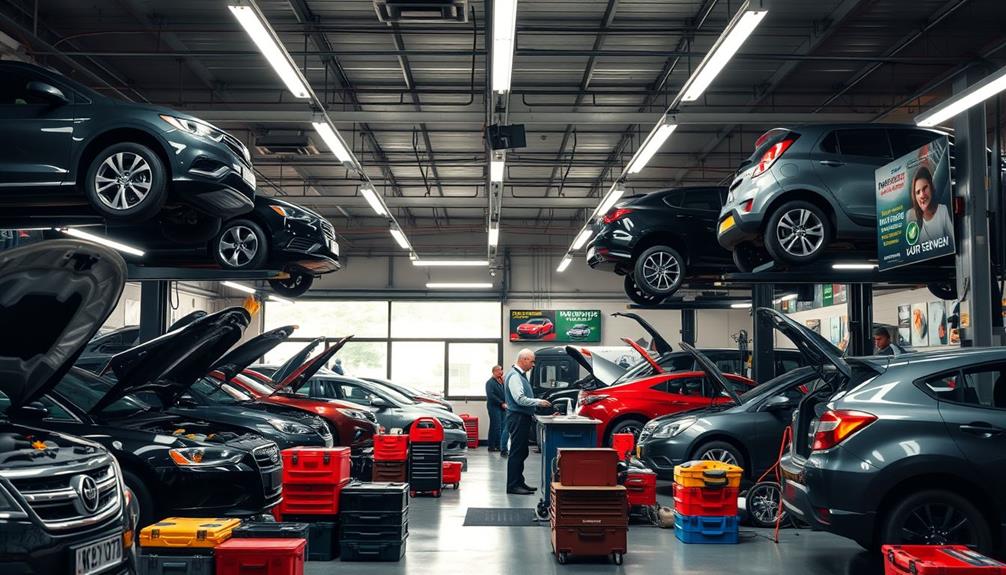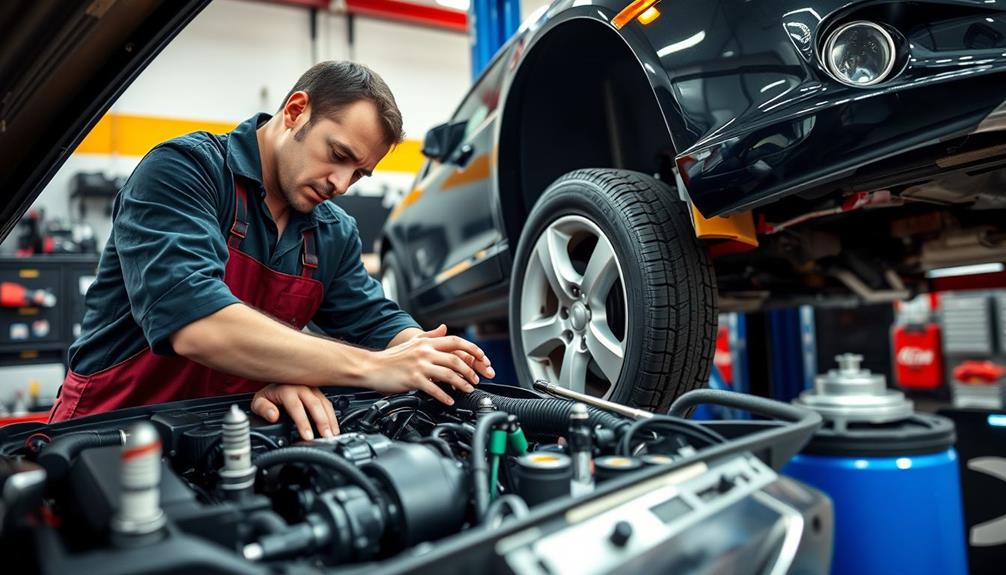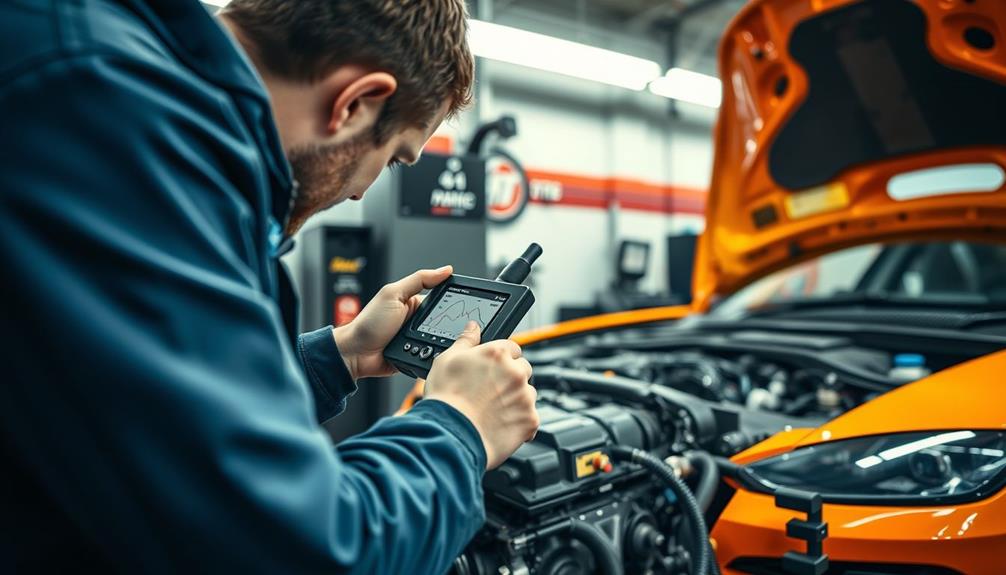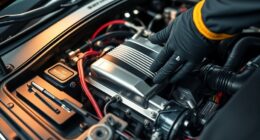To ask for a car tune-up, start by describing any symptoms your vehicle is showing, like a check engine light or sluggish acceleration. Be clear about your car's mileage and maintenance history when you talk to the technician. Request a checklist of services they recommend and ask about the estimated cost. It's also helpful to prepare by reviewing your owner's manual for specific requirements. Finding a reliable repair shop is essential, so look for good reviews and check their certifications. Keep these tips in mind, and you'll be ready for a smooth tune-up experience while ensuring your vehicle runs efficiently.
Key Takeaways
- Identify symptoms like warning lights or poor acceleration to clearly communicate your vehicle's needs to the technician.
- Research local repair shops for quality ratings and customer reviews to ensure reliable service.
- Provide your vehicle's mileage and maintenance history for context during your visit.
- Ask for a detailed checklist of services and an estimated cost before agreeing to the tune-up.
- Schedule regular maintenance every six months or 5,000 miles to prevent major issues and ensure optimal performance.
Understanding Car Tune-Ups
When it comes to keeping your vehicle in top shape, understanding car tune-ups is vital. A car tune-up is more than just an oil change; it involves a range of important services designed to enhance engine performance and guarantee your car operates efficiently. Typically, these routine maintenance tasks include replacing spark plugs, checking fluid levels, and inspecting belts and hoses.
To maintain your vehicle's longevity, it's advisable to schedule tune-ups every six months or 5,000 miles, following your manufacturer's guidelines. This not only helps keep your car running smoothly but also prevents potential issues that could arise from neglected maintenance.
A maintenance checklist can guide you through what needs to be done during a tune-up, allowing you to address minor problems before they escalate into costly repairs.
While modern vehicles may require fewer traditional tune-ups due to advanced electronic systems, regular inspections of critical components like brakes and wiper blades are still vital.
Signs Your Car Needs Attention

If your check engine light is on, it's a clear sign your car needs immediate attention.
You might also notice your vehicle isn't accelerating like it used to, which could indicate performance issues.
Paying attention to these symptoms can help you decide when to ask for that necessary tune-up.
Warning Lights Activation
The dashboard warning lights are your car's way of communicating urgent issues that need attention. Ignoring these signals can lead to serious damage and expensive repairs.
It's essential to understand the importance of selecting the right maintenance for your vehicle, just as you'd when considering cold medications overview for your health. Pay close attention to these common warning lights:
- Check Engine Light: This light indicates potential issues with the engine or related systems. It's critical for engine performance, so don't delay in getting a maintenance check.
- Brake Warning Light: If this light activates, it may point to problems with your braking system, which is crucial for your safety. Have it inspected immediately to prevent accidents.
- Tire Pressure Light: When this light comes on, check your tire pressure and inflate your tires as needed to avoid uneven wear or blowouts.
Stalling or sluggish performance often accompanies these warning lights, suggesting it's time for a tune-up to address underlying fuel or ignition system issues.
Performance Degradation Symptoms
Ignoring warning lights can lead to performance issues that demand your attention. If your check engine light is illuminated, it often indicates a problem that may require a tune-up. You might notice poor acceleration or sluggish response, which are clear signs of engine inefficiencies. Unusual knocking noises from the engine can also suggest mechanical problems, making it crucial to seek a tune-up to avoid further damage.
Here are some common symptoms to watch for:
| Symptom | Implication |
|---|---|
| Check engine light | Possible need for a tune-up |
| Poor acceleration | Engine inefficiencies |
| Stalling or difficulty starting | Fuel or ignition system issues |
| Decreased fuel economy | Engine performance deterioration |
| Engine misfires | Need for maintenance per schedule |
Addressing these symptoms promptly is essential for maintaining both performance and safety. Delaying a tune-up can lead to more extensive repairs, impacting your fuel economy and overall driving experience. Stay proactive with your maintenance schedule to keep your vehicle running smoothly.
Key Components of a Tune-Up

When you ask for a tune-up, it's vital to focus on essential services like spark plug replacements and oil changes.
Ignition system maintenance is also a key area that can greatly impact your car's performance.
Essential Tune-Up Services
A successful car tune-up hinges on several essential services that keep your vehicle running smoothly. To meet your vehicle needs effectively, focus on these key components during your next tune-up:
- Spark Plugs: Replacing spark plugs every 30,000 to 40,000 miles guarantees peak ignition efficiency, crucial for engine performance.
- Oil Change: A critical service, an oil change not only keeps engine components lubricated but also prolongs engine life. Check your owner's manual for the recommended frequency based on the type of oil used.
- Filters: Replacing air, oil, fuel, and PCV filters protects your engine from contaminants, maintaining fuel efficiency and overall performance.
Additionally, don't overlook belts and hoses; they should be inspected and replaced when necessary, as belts last between 50,000 and 100,000 miles.
Windshield wipers also deserve attention; replacing them during a tune-up guarantees clear visibility in adverse weather conditions.
Ignition System Maintenance
Maintaining your ignition system is essential for ensuring ideal engine performance and preventing frustrating misfires. The ignition system's key components include spark plugs, ignition wires, coils, the distributor cap, and rotor.
Spark plugs should be replaced every 30,000 to 40,000 miles to avoid misfires and maintain optimum fuel efficiency.
Regular maintenance of ignition wires is critical since they can wear out over time, leading to rough idling and decreased performance. Worn ignition wires can affect the spark delivery, causing your engine to run inefficiently.
Coils play an important role by transforming low voltage to high voltage; if they're worn, you may experience significant engine issues.
Don't forget the distributor cap and rotor, which should also be inspected regularly. These components help direct the electrical current to the correct cylinder, ensuring smooth engine operation.
Ignoring the signs of wear in any part of the ignition system can lead to costly repairs and decreased engine performance.
Cost of a Tune-Up
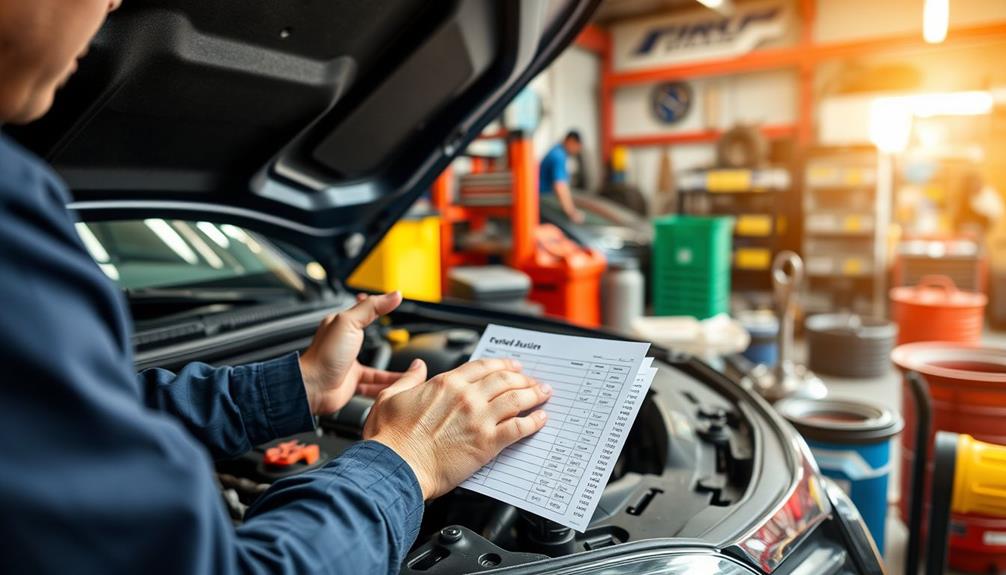
Understanding the cost of a car tune-up is vital for keeping your vehicle in top shape. You don't want to face costly repairs down the road because you skipped this critical maintenance.
A routine car tune-up typically ranges from $40 to $150, depending on various factors. Here's what to take into account:
- Minimal Tune-Ups: These usually cover basic services like oil changes and filter replacements, making them the most affordable option.
- Specialized Tune-Ups: If your vehicle requires more complex maintenance, expect to pay between $200 and $800.
- Geographic Location: Prices can vary greatly based on where you live and the reputation of the repair shop.
Before committing, it's wise to compare estimates from different shops. Some repair shops may offer bundled services or discounts for multiple repairs, which can help lower the overall cost of your tune-up.
Choosing the Right Repair Shop

Selecting the right repair shop is essential for ensuring your vehicle gets the best care possible. Start by researching local options; check customer reviews and ratings to gauge the quality service and reputation of each shop.
Look for certifications and qualifications of their technicians, as these indicate a higher level of expertise in vehicle maintenance.
It's also wise to compare estimates and service details from multiple repair shops. This way, you can find a balance between cost and the quality of services offered for your car's needs.
Consider opting for a shop that specializes in your specific vehicle make. They often have more experience and knowledge regarding your car's unique requirements, which can lead to better service.
Lastly, verify that the shop follows manufacturer recommendations for maintenance and repairs. Adhering to these guidelines can help maintain your vehicle's warranty and performance.
Communicating With Your Technician
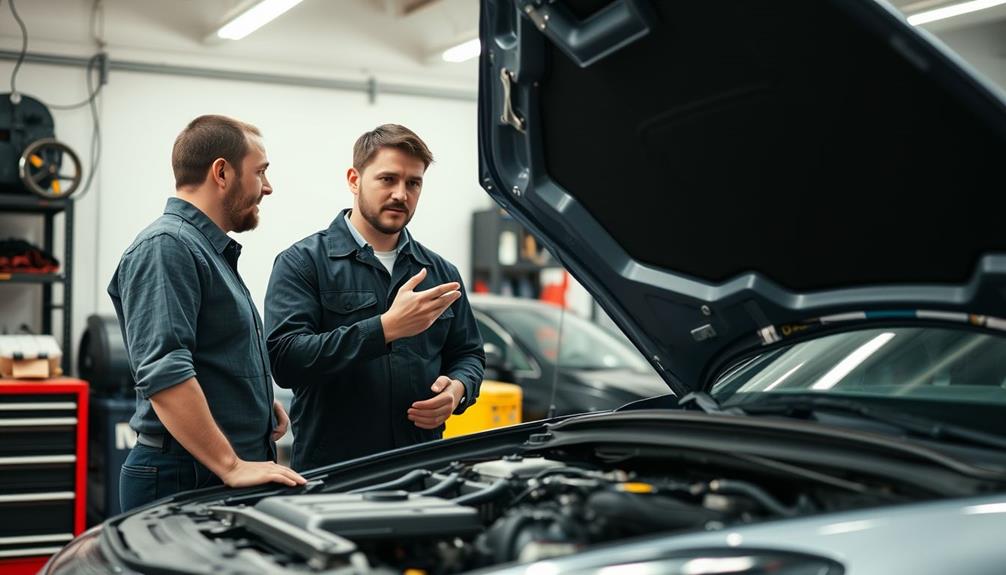
Once you've found a reliable repair shop, effective communication with your technician is key to ensuring your car receives the proper care.
Start by clearly describing any symptoms you've noticed. This could include reduced performance, unusual noises, or warning lights. Such details will help your technician diagnose potential issues more effectively.
Next, provide your vehicle's mileage and maintenance history. Mention when the last tune-up was performed to give context for service recommendations.
Finally, don't hesitate to ask questions about the services included in the tune-up. Here's a quick checklist to guide your conversation:
- Components: Inquire about specific parts being replaced, like spark plugs and filters.
- Cost: Ask for an estimated cost and duration of the tune-up. Typical prices range from $40 to $150 for minimal services.
- Checklist: Request a checklist of services that will be performed, ensuring essential components like belts, hoses, and brakes are inspected.
Importance of Regular Maintenance
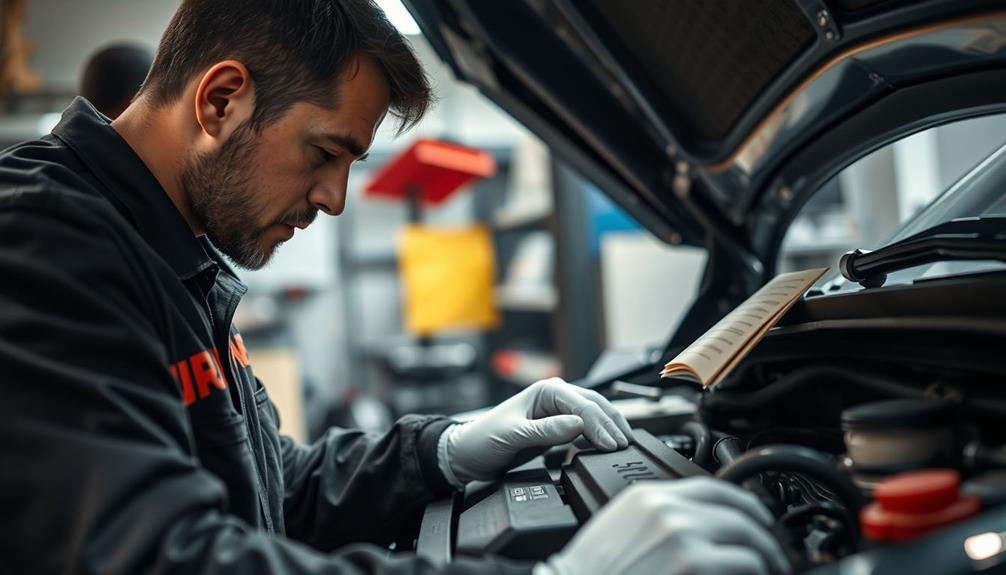
Regular maintenance is essential for keeping your vehicle running smoothly and reliably. Engaging in preventive maintenance, like tune-ups and oil changes, not only boosts vehicle performance but also minimizes the risk of unexpected breakdowns. Ideally, you should schedule these services every six months or after 5,000 miles to guarantee your car remains in top condition.
Just as individuals with BPD experience intense emotional responses that require ongoing management, vehicles need regular check-ups to address potential issues before they escalate.
Ignoring regular maintenance can lead to costly repairs down the line, as minor issues can escalate into major problems. Routine checks, including filter replacements, are critical for maintaining engine health and enhancing your overall driving experience.
A well-maintained vehicle not only extends its lifespan but also contributes to better reliability and safety on the road.
Furthermore, keeping a documented service history is essential; many manufacturers require evidence of regular maintenance to uphold warranty coverage. So, don't neglect those routine checks—your vehicle's performance, engine health, and your safety depend on it.
Additional Services to Consider
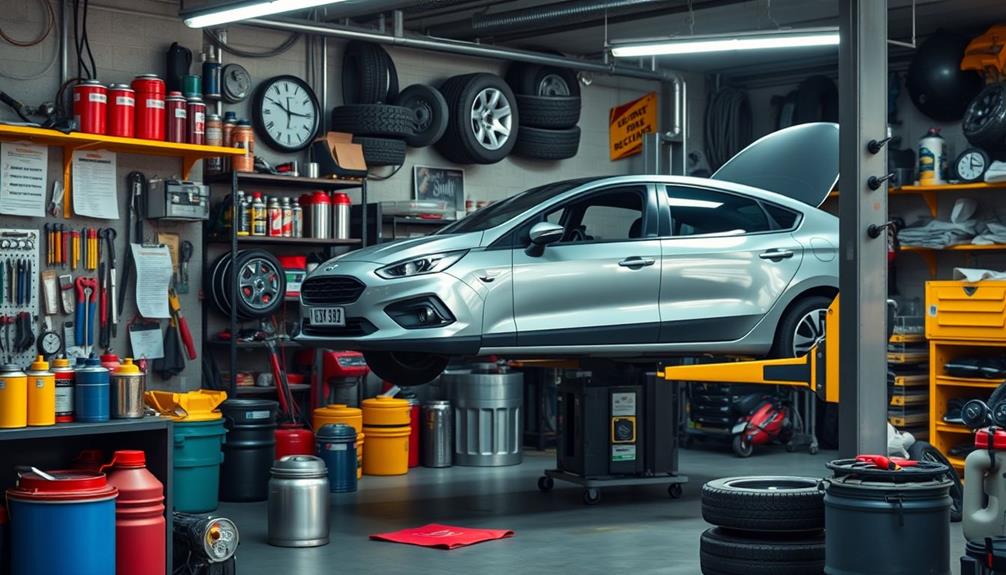
When scheduling your car's tune-up, don't overlook additional services that can enhance your vehicle's performance and safety.
These services can be vital to guaranteeing your car runs smoothly and safely. Here are three key services to take into account:
- Brake Inspection: Regularly check your brake pads and rotors. They wear down over time, and maintaining them is essential for vehicle safety.
- Fluid Maintenance: Inquire about engine oil, coolant, and transmission fluid changes. Keeping these fluids at ideal levels prevents engine damage and guarantees peak performance.
- Battery Check and Belts and Hoses Inspection: A thorough battery check can identify weak spots, preventing unexpected failures, especially during extreme weather.
Additionally, inspecting belts and hoses can help avoid costly repairs due to engine overheating or failure.
Preparing for Your Appointment

Preparing for your car tune-up appointment requires some thoughtful steps to guarantee you get the most out of your visit. Start by checking your owner's manual for specific maintenance recommendations and routine service intervals. This will help you understand what services your vehicle truly needs. Next, make a list of any abnormalities or issues you have noticed with your car lately. This will help your mechanic pinpoint any potential problems during the tune-up. Finally, gather all of your car tuneup essentials such as your owner’s manual, vehicle registration, and any previous service records to bring with you to the appointment. This will ensure that your mechanic has all the necessary information to give your car the best care possible.
Next, create a car tune-up checklist that includes any symptoms or issues you've noticed, such as reduced performance or warning lights. This information can help the technician address your concerns more effectively.
It's also essential to gather your vehicle's maintenance history, including previous tune-ups and repairs, to give the technician a complete picture.
Before your appointment, research local repair shops to find a reputable service provider that specializes in your specific vehicle make or model.
Don't forget to prepare a budget for the tune-up. Costs can vary, typically ranging from $40 to $150 for minimal services, and up to $800 for specialized inspections.
Keeping these steps in mind will guarantee you're well-prepared and can communicate your needs clearly, leading to a successful car tune-up experience.
Frequently Asked Questions
What Is the Average Cost of a Full Tune-Up?
The average cost of a full tune-up typically ranges from $200 to $800, depending on your vehicle's complexity and the services needed. Regular maintenance can save you money on more serious repairs down the line.
What Is Needed for a Full Tune-Up on a Car?
Think of your car like a musical instrument; it needs regular tuning. For a full tune-up, you'll need an oil change, spark plug replacements, air filter checks, brake inspections, and tire evaluations. Keep it running smoothly!
How Do You Tell You Need a Tune-Up?
You can tell you need a tune-up by noticing your check engine light, reduced performance, unusual noises, stalling issues, or a drop in mileage. These signs indicate your vehicle might need attention to run smoothly again.
How Often Should a Car Get a Tune-Up?
Like a heart needing regular check-ups, your car should get a tune-up every 6 months or every 5,000 miles. This keeps it running smoothly and helps avoid costly repairs down the road.
Conclusion
So, you've decided to ignore those warning signs and skip the tune-up? Great plan—until your car starts sounding like a symphony of clinks and clanks! Remember, a tune-up isn't just a luxury; it's your vehicle's way of asking for a little TLC. By prioritizing regular maintenance, you save yourself from unexpected breakdowns and hefty repair bills. Next time you think about putting it off, imagine your car silently rolling its eyes at you. Don't let it down!
